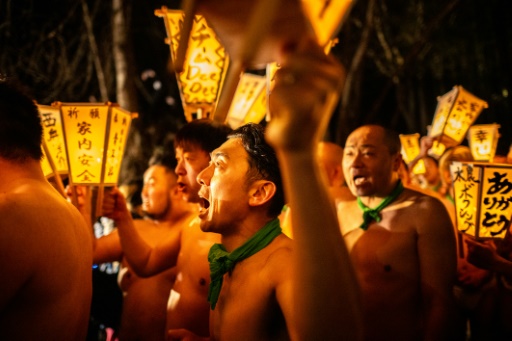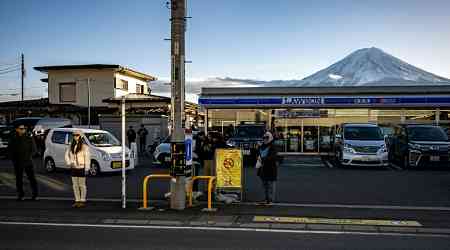A steam of sweat rose as hundreds of naked men tussled over a bag of wooden talismans, performing a dramatic end to a thousand-year-old ritual in Japan that took place for the last time.
Their passionate chants of jasso, joyasa (meaning "evil, be gone") echoed through a cedar forest in Iwate Prefecture, where the secluded Kokuseki Temple has decided to end the popular annual rite.
Organizing the event, which draws hundreds of participants and thousands of tourists every year, has become a heavy burden for the aging local faithful, who find it hard to keep up with the rigors of the ritual.
The Sominsai festival, regarded as one of the strangest festivals in Japan, is the latest tradition impacted by the country's aging population crisis that has hit rural communities hard.
"It is very difficult to organize a festival of this scale," said Daigo Fujinami, a resident monk of the temple that opened in 729.
"You can see what happened today --so many people are here and it's all exciting. But behind the scenes, there are many rituals and so much work that have to be done," he said. "I cannot be blind to the difficult reality."
Japan's society has aged more rapidly than most other countries'. The trend has forced countless schools, shops and services to close, particularly in small or rural communities.
Kokuseki Temple's Sominsai festival used to take place from the seventh day of Lunar New Year through to the following morning.
But during the COVID pandemic, it was scaled down to prayer ceremonies and smaller rituals.
The final festival was a shortened version, ending around 11:00 pm, but it drew the biggest crowd in recent memory, local residents said.
As the sun set, men in white loincloths came to the mountainous temple, bathed in a creek and marched around temple's ground.
They clenched their fists against the chill of a winter breeze, all the while chanting jasso joyasa.
Some held small cameras to record their experience, while dozens of television crews followed the men through the temple's stone steps and dirt pathways.
As the festival reached its climax, hundreds of men packed inside the wooden temple shouting, chanting and aggressively jostling over a bag of talismans.
Toshiaki Kikuchi, a local resident who claimed the talismans and who helped organize the festival for years, said he hoped the ritual will return in the future.
"Even under a different format, I hope to maintain this tradition," he said after the festival. "There are many things that you can appreciate only if you take part."
Many participants and visitors voiced both sadness and understanding about the festival's ending.
"This is the last of this great festival that has lasted 1,000 years. I really wanted to participate in this festival," Yasuo Nishimura, 49, a caregiver from Osaka, told AFP.
Other temples across Japan continue to host similar festivals where men wear loincloths and bathe in freezing water or fight over talismans.
Some festivals are adjusting their rules in line with changing demographics and social norms so that they can continue to exist -- such as letting women take part in previously male-only ceremonies.
From next year, Kokuseki Temple will replace the festival with prayer ceremonies and other ways to continue its spiritual practices.
"Japan is facing a falling birthrate, aging population, and lack of young people to continue various things," Nishimura said. "Perhaps it is difficult to continue the same way as in the past."






















